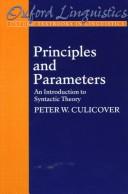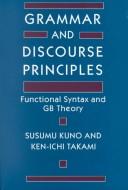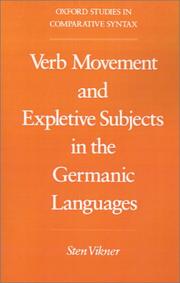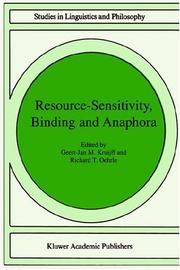| Listing 1 - 8 of 8 |
Sort by
|
Book
ISSN: 09336079 ISBN: 3906770435 9783906770437 Year: 2003 Volume: 70 Publisher: Berne Lang
Abstract | Keywords | Export | Availability | Bookmark
 Loading...
Loading...Choose an application
- Reference Manager
- EndNote
- RefWorks (Direct export to RefWorks)
French language --- Grammar --- Government-binding theory (Linguistics) --- Liage et gouvernement [Théorie de ] --- Regeer- en bindtheorie (Taalwetenschap) --- Syntax. --- Grammar, Generative. --- Government-binding theory (Linguistics). --- Syntax --- Generative grammar --- French language - Syntax. --- French language - Grammar, Generative.

ISBN: 0521391113 0521400007 0511627831 Year: 1991 Publisher: Cambridge : Cambridge University Press,
Abstract | Keywords | Export | Availability | Bookmark
 Loading...
Loading...Choose an application
- Reference Manager
- EndNote
- RefWorks (Direct export to RefWorks)
There are a number of persistent anomalies in binding theory. One is the lack of an integrated view of long distance anaphora. Anaphors generally require an antecedent, but languages have been shown to show striking differences as to where such antecedents may occur. This volume is a collection of original articles by distinguished contributors on the nature of anaphoric systems in a wide variety of genetically and structurally different languages, and it examines the general laws underlying the apparent diversity of data from the perspective of current linguistic theory. There is a surprising degree of convergence in the analyses proposed. A substantive introduction summarises and discusses the main results, providing an integrative picture of individual and common results. This is the first representative collection of articles on this important topic. It is both conceptually coherent and of real theoretical importance.
Anafoor (Taalwetenschap) --- Anaphora (Linguistics) --- Anaphore (Linguistique) --- Government-binding theory (Linguistics) --- Liage et gouvernement [Théorie de ] --- Regeer- en bindtheorie (Taalwetenschap) --- Anaphore --- Théorie du liage et du gouvernement (Linguistique) --- Théorie du liage et du gouvernement (Linguistique) --- Arts and Humanities --- Language & Linguistics --- Binding theory (Linguistics) --- Government and binding (Linguistics) --- Generative grammar --- Linguistics --- Cross-reference (Linguistics) --- Grammar, Comparative and general --- Reference (Linguistics)

ISBN: 0631177175 Year: 1991 Publisher: Oxford Blackwell
Abstract | Keywords | Export | Availability | Bookmark
 Loading...
Loading...Choose an application
- Reference Manager
- EndNote
- RefWorks (Direct export to RefWorks)
Linguistics --- Game-theoretical semantics --- Government-binding theory (Linguistics) --- Liage et gouvernement [Théorie de ] --- Regeer- en bindtheorie (Taalwetenschap) --- Speltheoretische semantiek --- Sémantique inspirée par la théorie des jeux --- Game-theoretical semantics. --- Government binding theory (Linguistics) --- Methodology. --- -Linguistic science --- Science of language --- Language and languages --- Binding theory (Linguistics) --- Government and binding (Linguistics) --- Generative grammar --- Game theory --- Semantics --- Semantics (Philosophy) --- Methodology --- -Methodology --- Government binding theory (Linguistics). --- -Binding theory (Linguistics) --- Linguistic science --- Linguistics - Methodology.

ISBN: 0198700148 0198700156 9780198700142 Year: 1997 Volume: *1 Publisher: Oxford Oxford University Press
Abstract | Keywords | Export | Availability | Bookmark
 Loading...
Loading...Choose an application
- Reference Manager
- EndNote
- RefWorks (Direct export to RefWorks)
Grammar --- Government-binding theory (Linguistics) --- Liage et gouvernement [Théorie de ] --- Principes en parameters (Taalwetenschap) --- Principes et paramètres (Linguistique) --- Principles and parameters (Linguistics) --- Regeer- en bindtheorie (Taalwetenschap) --- Grammar, Comparative and general --- Théorie du liage et du gouvernement (Linguistique) --- Syntaxe --- Syntax --- Syntax. --- 801.56 --- -Principles and parameters (Linguistics) --- Generative grammar --- Comparative grammar --- Grammar, Philosophical --- Grammar, Universal --- Language and languages --- Philosophical grammar --- Linguistics --- Philology --- Binding theory (Linguistics) --- Government and binding (Linguistics) --- Syntaxis. Semantiek --- Grammar, Comparative --- 801.56 Syntaxis. Semantiek --- Government-binding theory (Linguistics). --- Principles and parameters (Linguistics). --- Théorie du liage et du gouvernement (Linguistique) --- Principes et paramètres (Linguistique) --- Grammar [Comparative and general ] --- Grammar, Comparative and general - Syntax --- Grammar, Comparative and general Syntax
Book
ISBN: 0521370051 9780521370059 Year: 1992 Volume: vol *2 Publisher: Cambridge Cambridge University press
Abstract | Keywords | Export | Availability | Bookmark
 Loading...
Loading...Choose an application
- Reference Manager
- EndNote
- RefWorks (Direct export to RefWorks)
Dutch language --- Grammar --- Dialectology --- Government-binding theory (Linguistics) --- Liage et gouvernement [Théorie de ] --- Regeer- en bindtheorie (Taalwetenschap) --- Néerlandais (Langue) --- Théorie du liage et du gouvernement (Linguistique) --- Dialects --- Grammar, Generative --- Pronoun --- Verb phrase --- Dialectes --- Pronom --- Syntagme verbal --- 801.56 --- 803.93-087 --- -Dutch language --- -Government-binding theory (Linguistics) --- Binding theory (Linguistics) --- Government and binding (Linguistics) --- Generative grammar --- Linguistics --- Flemish language --- Netherlandic language --- Germanic languages --- Syntaxis. Semantiek --- Nederlands: dialecten --- -Grammar, Generative --- Grammar, Generative. --- Pronoun. --- Verb phrase. --- 803.93-087 Nederlands: dialecten --- 801.56 Syntaxis. Semantiek --- Government-binding theory (Linguistics). --- Grammaire générative --- Néerlandais (Langue) --- Théorie du liage et du gouvernement (Linguistique) --- Grammaire générative --- Belgium --- West Flanders (Belgium) --- To 1500 --- Dutch language - Dialects - Belgium - West Flanders. --- Dutch language - Pronoun. --- Dutch language - Verb phrase. --- Dutch language - Grammar, Generative. --- Dutch language - Dialects - Belgium - West Flanders --- Dutch language - Grammar, Generative --- Dutch language - Pronoun --- Dutch language - Verb phrase

ISBN: 0226462048 9780226462042 Year: 1993 Publisher: Chicago, Ill. University of Chicago Press
Abstract | Keywords | Export | Availability | Bookmark
 Loading...
Loading...Choose an application
- Reference Manager
- EndNote
- RefWorks (Direct export to RefWorks)
Grammar --- Fonctionalisme (Linguistique) --- Functionalism (Linguistics) --- Functionalisme (Taalwetenschap) --- Generatieve spraakkunst --- Generative grammar --- Government-binding theory (Linguistics) --- Grammaire générative --- Grammaire transformationnelle --- Grammar [Comparative and general ] -- Derivation --- Grammar [Generative ] --- Grammar [Transformational ] --- Grammar [Transformational generative ] --- Grammatica [Generatieve ] --- Grammatica [Transformationele ] --- Liage et gouvernement [Théorie de ] --- Regeer- en bindtheorie (Taalwetenschap) --- Spraakkunst [Generatieve ] --- Spraakkunst [Transformationele ] --- Transformational generative grammar --- Transformational grammar --- Transformationele grammatica --- Transformationele spraakkunst --- Transformationele taaltheorie --- Grammar, Comparative and general --- Generative grammar. --- Syntax. --- 801.56 --- Syntaxis. Semantiek --- 801.56 Syntaxis. Semantiek --- Language and languages --- Syntax --- Binding theory (Linguistics) --- Government and binding (Linguistics) --- Linguistics --- Grammar, Generative --- Grammar, Transformational --- Grammar, Transformational generative --- Psycholinguistics --- Functional analysis (Linguistics) --- Functional grammar --- Functional linguistics --- Functional-structural analysis (Linguistics) --- Grammar, Functional --- Grammatical functions --- Structural linguistics --- Derivation --- Grammar [Comparative and general ] --- Philology --- Grammar, Comparative and general - Syntax. --- Grammar, Comparative and general Syntax

ISBN: 0195083946 0195083938 0195359259 128044360X 1601299400 9780195083941 9780195083934 9781601299406 9780195359251 9786610443604 6610443602 0197722776 Year: 1995 Volume: *4 Publisher: New York (N.Y.): Oxford university press
Abstract | Keywords | Export | Availability | Bookmark
 Loading...
Loading...Choose an application
- Reference Manager
- EndNote
- RefWorks (Direct export to RefWorks)
This is a study of two different kinds of variation across the Germanic languages. One involves the position of the finite verb, and the other the possible positions of the "logical" subject in constructions with expletive (or "dummy") subjects. The book applies the theory of principles and parameters (also known as the "government-binding theory") to the study of comparative syntax. Several languages are considered, including less frequently discussed ones like Danish, Faroese, Icelandic, and Yiddish.
Germanic languages --- Grammar --- Generatieve spraakkunst --- Generative grammar --- Government-binding theory (Linguistics) --- Grammaire générative --- Grammaire transformationnelle --- Grammar [Comparative and general ] -- Derivation --- Grammar [Generative ] --- Grammar [Transformational ] --- Grammar [Transformational generative ] --- Grammatica [Generatieve ] --- Grammatica [Transformationele ] --- Liage et gouvernement [Théorie de ] --- Regeer- en bindtheorie (Taalwetenschap) --- Spraakkunst [Generatieve ] --- Spraakkunst [Transformationele ] --- Transformational generative grammar --- Transformational grammar --- Transformationele grammatica --- Transformationele spraakkunst --- Transformationele taaltheorie --- Langues germaniques --- Théorie du liage et du gouvernement (Linguistique) --- Subjectless constructions --- Syntax --- Verb phrase --- Impersonnels --- Syntaxe --- Syntagme verbal --- 803 --- -Germanic languages --- -Generative grammar --- Binding theory (Linguistics) --- Government and binding (Linguistics) --- Linguistics --- Grammar, Comparative and general --- Grammar, Generative --- Grammar, Transformational --- Grammar, Transformational generative --- Psycholinguistics --- Teutonic languages --- Indo-European languages --- Germaanse taalkunde --- Derivation --- Germanic Languages --- Languages & Literatures --- Generative grammar. --- Subjectless constructions. --- Syntax. --- Verb phrase. --- 803 Germaanse taalkunde --- Government-binding theory (Linguistics). --- Grammaire générative --- Théorie du liage et du gouvernement (Linguistique) --- Germanic languages - Verb phrase. --- Germanic languages - Subjectless constructions. --- Germanic languages - Verb phrase --- Germanic languages - Syntax --- Germanic languages - Subjectless constructions

ISBN: 1402016913 1402016921 9401000379 Year: 2003 Volume: 80 Publisher: Dordrecht Boston London Kluwer academic publishers
Abstract | Keywords | Export | Availability | Bookmark
 Loading...
Loading...Choose an application
- Reference Manager
- EndNote
- RefWorks (Direct export to RefWorks)
Geert-Jan Kruijff & Richard T. Oehrle A categorial grammar is both a grammar and a type inference system. As a result of this duality, the categorial framework offers a natural setting in which to study questions of grammatical composition, both empirically and abstractly. There are affinities in this perspective, of course, to basic questions in formal language theory. But the fact that categorial grammars are type in ference systems makes possible intrinsic connections among syntactic types, syntactic type inference, semantic types, and semantic type inference, a con nection less apparent in the standard constructions of formal language theory. Fixing a system of grammatical type inference T, we may explore what gram matical phenomena are compatible with T-and equally, what grammatical phenomena are not. Equally, fixing a class of grammatical phenomena g, we may seek to ascertain what systems of type inference characterize g. This dual perspective is a strong current in the categorial literature, going back to the classical papers of Ajdukiewicz, Bar-Hillel, Curry, and Lambek.
Anafoor (Taalwetenschap) --- Anaphora (Linguistics) --- Anaphore (Linguistique) --- Government-binding theory (Linguistics) --- Grammaire comparée et générale --- Grammaire générale --- Grammaire générale et comparée --- Grammaire philosophique --- Grammaire universelle --- Grammar [Comparative and general ] --- Liage et gouvernement [Théorie de ] --- Regeer- en bindtheorie (Taalwetenschap) --- Spraakkunst [Vergelijkende en algemene ] --- Grammar, Comparative and general --- Théorie du liage et du gouvernement (Linguistique) --- Anaphore --- Grammar, Comparative and general. --- Anaphora (Linguistics). --- Government-binding theory (Linguistics). --- Grammaire comparée et générale --- Théorie du liage et du gouvernement (Linguistique) --- Computational linguistics. --- Logic. --- Artificial intelligence. --- Computational Linguistics. --- Artificial Intelligence. --- AI (Artificial intelligence) --- Artificial thinking --- Electronic brains --- Intellectronics --- Intelligence, Artificial --- Intelligent machines --- Machine intelligence --- Thinking, Artificial --- Bionics --- Cognitive science --- Digital computer simulation --- Electronic data processing --- Logic machines --- Machine theory --- Self-organizing systems --- Simulation methods --- Fifth generation computers --- Neural computers --- Argumentation --- Deduction (Logic) --- Deductive logic --- Dialectic (Logic) --- Logic, Deductive --- Intellect --- Philosophy --- Psychology --- Science --- Reasoning --- Thought and thinking --- Automatic language processing --- Language and languages --- Language data processing --- Linguistics --- Natural language processing (Linguistics) --- Applied linguistics --- Cross-language information retrieval --- Mathematical linguistics --- Multilingual computing --- Methodology --- Data processing
| Listing 1 - 8 of 8 |
Sort by
|

 Search
Search Feedback
Feedback About UniCat
About UniCat  Help
Help News
News